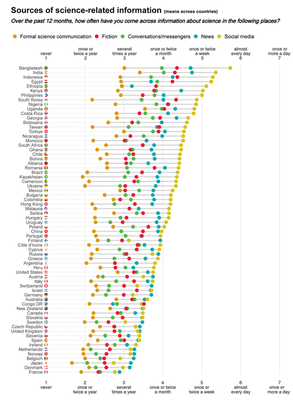Public communication about science across 68 countries: Global evidence on how people get information and communicate about science-related matters
This study gives nationally representative insights into people’s science information diets and communication behavior and elucidates cross-country patterns. It relies on a cross-sectional survey with 71,922 participants in 68 countries as well as external country-level indicators for national levels of educational attainment, freedom of academic exchange and dissemination, access to digital media, GDP per capita, press freedom, freedom of speech, and the degree of democratic deliberation.
Abstract
Science communicators, educators, and policy-makers around the world need robust evidence on how people inform themselves about science-related issues and communicate about them with others. We provide such evidence, drawing on a global population survey (n = 71,922 in 68 countries) that gives nationally representative insights into people’s science information diets and communication behavior and elucidates cross-country patterns. The analyses show that social media are the most important source of science-related information in most countries—except in those with pluralistic, professionalized, state-subsidized, and public service-oriented media, where people report using news media more frequently. The results also suggest that citizens in collectivist societies are less outspoken about science in daily life. Participation in public protests on science-related issues, such as climate change and COVID-19, seems to depend on local legislative conditions and the importance of civic engagement in political culture. Further analyses test whether country differences are contingent upon national levels of educational attainment, freedom of academic exchange and dissemination, access to digital media, GDP per capita, press freedom, freedom of speech, and the degree of democratic deliberation. Overall, we provide unique comparative evidence on public communication about science across the world, which can help to inform science communication scholarship and practice globally.

Figure 1: Average frequency of exposure to information about science and science-related issues across countries.
___________________________________________________________
Please cite as: Mede, N. G., Cologna, V., Berger, S., Besley, J. C., Brick, C., Joubert, M., Maibach, E., Mihelj, S., Oreskes, N., & Schäfer, M. S. (2024). Public communication about science across 68 countries: Global evidence on how people get information and communicate about science-related matters. Preprint. https://osf.io/preprints/osf/xb3ha
Link to preprint: https://osf.io/preprints/osf/xb3ha
Social media: Post on X